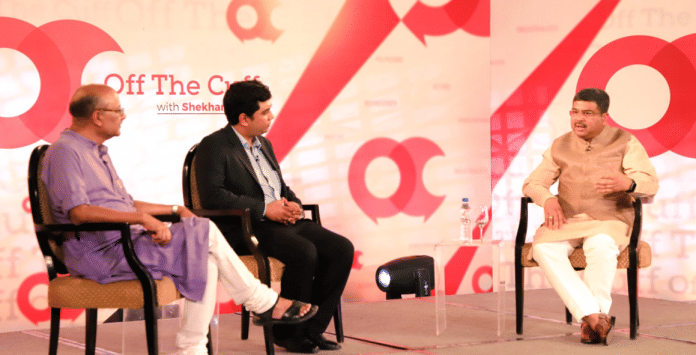Petroleum minister insists the economy is not in a state of lapse, shoots down the idea of subsidies to keep petrol and diesel prices in check.
The Indian economy is in good shape and the fear of a slowdown is a narrative designed by opposition parties and rivals, Union Petroleum and Natural Gas Minister Dharmendra Pradhan said.
Pradhan said that India was the prime destination for investment currently, and this showed the “robustness of the economy”. He insisted that the economy was not in a state of lapse, as was being made out.
Pradhan was speaking at ThePrint’s ‘Off The Cuff’ event and was in conversation with ThePrint’s Editor-in-Chief Shekhar Gupta and Editor Pranab Dhal Samanta.
“This is a designed narrative by our friends,” he said, referring to the BJP’s rivals. “In a democracy, we expect this kind of criticism, and there is nothing to be worried about, but what is there on the ground needs to be judged.”
He went on to explain how many investment projects have kickstarted in the oil sector, including state-owned Bharat Petroleum and Reliance Industries initiating work on the KG Basin in Andhra Pradesh, as well as foreign investment flowing in from Saudi Arabia.
Asked specifically about the economic disruptions caused by recent policy decisions such as demonetisation and the implementation of Goods and Services Tax, Pradhan asserted: “We moulded the mature democracy of India.”
Challenges for petroleum sector
Pradhan highlighted many key challenges faced by the petroleum sector. These include prioritising energy accessibility for poor households, as well as the need to reduce import dependency to meet the oil requirements of the country by 2020.
This, Pradhan said, needed to be done by augmenting production. “With these kind of oil prices, from $50 to $60 dollars (per barrel), where there is a cut down (in investment) in the world’s exploration and production (E&P) sector, India is attracting investment in the area. This is only due to the policy reform done by the Modi government,” he said.
Asked about the 100 per cent tax burden on petroleum being borne by the consumer, Pradhan explained that with the country moving towards “one nation, one tax”, petrol and diesel, being key economic commodities, should also fall under the same tax system.
“Looking at the sensitivity of price rise, recently the government of India has reduced Rs 2 each on the excise duty on petrol and diesel,” Pradhan said. And because of this, some states are beginning to reduce their own VAT.
Pradhan also shot down the idea of subsidies. “A time will come when competition will bring the prices down. Subsidy is not the answer,” he said.
On the political front
Pradhan also talked about the failure of the BJP’s campaign in his home state of Odisha in 2014. The assembly elections were held concurrently with the 2014 Lok Sabha polls, but the BJP won just 10 seats and lost heavily to the Biju Janata Dal led by Naveen Patnaik, who became CM for the fourth successive term with 117 seats in the 147-member house.
“If you’re talking about 2014, then I agree that we failed. I will not hesitate to admit that. We could not channel the Modi wave in that area,” he said. However, he criticised Patnaik’s 17 years in power, saying that out of 90 lakh households in Odisha, 40 lakh still didn’t have electricity.
“There is huge discontent in the society, and people are looking for an alternative,” he said, adding that the BJP was working with a vision towards a better performance.
A member of the audience pointed out that Pradhan campaigned for the BJP in Bihar in 2015, which involved discrediting Nitish Kumar, but within two years, they were back together as allies. Pradhan, though, replied: “We are made for each other. Nitish Kumar is a far-sighted person. PM Modi’s vision and Nitish’s work and (deputy CM and BJP leader) Sushil Modi’s contribution is a deadly combination for Bihar. Bihar needed this.”







